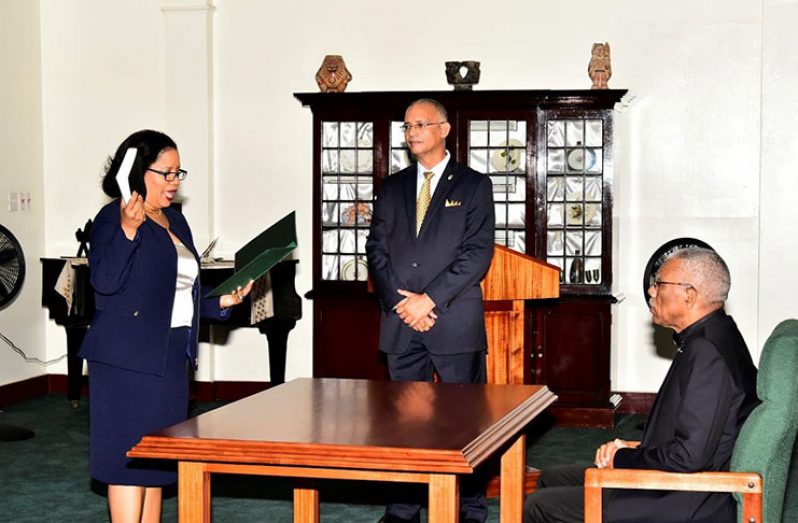NEWLY appointed Chairperson of the Public Utilities Commission (PUC), Dela Britton said that the agency is being retooled to have all the necessary directives in place on the verge of the liberalisation of the telecommunications sector.
“The Commission, as I said, has to be retooled and being retooled means that we have to have the necessary personnel to assist in that regard,” said the PUC Chairperson. July month end has been announced as the target for the full liberalisation of the telecommunications sector. Britton was sworn in on Wednesday by President David Granger at State House, in the presence of subject Minister Catherine Hughes, Minister of State Joseph Harmon, Permanent Secretary, Ministry of Public Telecommunications Derrick Cummings and Jennifer Britton, her sister.
“Plans are afoot right now to have all the things in place before liberalisation would come to force,” said Britton who is an Attorney-at-law. She assured that with its new responsibilities, Commissioners of the PUC are capable to fulfill their mandate as all have years of experience and are professionals.
“We do have a dynamic group of professionals and the Commissioners have been there for some years, so we are all schooled in how to operate and deliberate on certain issues. Our duties are strict under the legislation, and because they are strict we have mandatory obligations to the consumer, the telecoms utility, to the minister. At present, we advise the minister but we would have to have greater collaboration with the ministry,” Britton added.
Meanwhile, President Granger in his brief remarks, noted that the PUC has enforced a regime of regulation, which safeguards the public interest without jeopardising the economic sustainability of utilities.
“The Public Utilities Commission… regulates utilities, which provide economic and societal services to businesses, private individuals and the Government. The availability of water, electricity and communication services are associated with a higher quality of life and a high standard of human and societal well-being, throughout the country and the reduction of inequality. These services also contribute to the creation of wealth, the generation of employment and the sustaining of livelihoods and the provision of a good life,” he said.
The Commission, established by the Public Utilities Commission Act No. 26 of 1990, serves to regulate, investigate and enforce the provisions of the PUC Act. It also makes rules for the quality and standards of service to be maintained by a public utility and, in this regard, is empowered to initiate and conduct investigations into the operations and standards of service provided by any utility; ensures that public utilities provide adequate, efficient, non-discriminatory and safe services to the public [and] ensures that just rates are proposed, demanded and received by any public utility.
The Head-of-State congratulated Britton on her appointment and thanked outgoing Chairman retired Justice Prem Persaud, who proceeded into retirement in March, for serving the PUC for nearly two decades.
FULL LIBERALISATION
Meanwhile, Hughes told reporters that if government fails to meet the deadline for the full liberalisation of the telecommunications sector, there should be no alarm as much needs to be accomplished before. The legislation was passed in August of last year and President Granger assented to it shortly after.
“We had to have a consultant look at spectrum management pricing because the National Frequency Management Unit (NFMU) now comes under new agency,” Hughes stated.
She noted that the legislation has several new requirements and work is being done to ensure that all aspects of the legislation are covered. Negotiations between the Guyana Telephone and Telegraph Company (GTT), its parent company – Atlantic Tele Network (ATN) – and the government continue and according to Minister Hughes, that process is going well.
She said that the pricing for spectrum and the process by which applications for new licences would be received are some of the concerns raised by GTT. The Guyana Revenue Authority (GRA) is also involved in the process.





.jpg)








